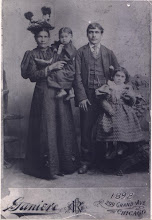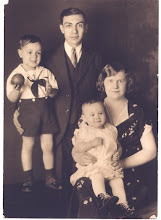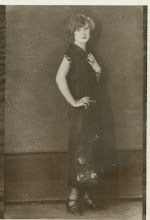11 gennaio 2010.
For some of you, la storia `e noiosa (history is boring). So if you see "storia" or "history" in the title, just skip the blog! Today was uneventful. Non piove, ma fa troppo freddo. (No but it is very cold… or as Nonna says "bruttisimo"). I opted out of a walk through town because I now have the cold (no surprise here, I seem to always get sick on vacation). Also Nonna is sick and I am worried about her because she still won't rest. Yes, I take two "Airborne" per day… and I'm giving them to everyone here. Also, I used some of Thais' Vicks Vaporub and insisted that Nonna did too. We stink but it helps (at least psychologically). Is the fact that Italians use Vicks the third proof I am Italian?
Ok, so I left off with Napoleon in Italy, didn't I?
Napoleon didn't last long… about 11 years, I think… and the Bourbons reconquered Sicely, then the southern peninsula (or vice versa.. non `e importante). But Italians now had a taste of being a republic. Much of the populace, however, either supported the Bourbons, or didn't comprehend that a republic meant any change for their lives or maybe just didn't like the French. The pope certainly didn't like the Napoleon's republic because they separated church and state and took away much of the civil authority of the local priests. Of course the priests told the peasants how evil this was.. therefore the peasants believed they should be loyal to the Bourbons because they were good Catholic rulers who supported the pope.
In Calvello, Ghirardo Ferri didn't like the French because they stole his sheep; but he also didn't like being ruled by any outsiders. People in Basilicata liked being "remote", and preferred that the government ignore them as much as possible! He wasn't a revolutionary, in fact, he considered himself to be conservative. He didn't like liberals and this was a cause of friction between him and his son Michele who liked to think of himself as liberal. He also didn't like it when the returning Boubon's sent a marshall to oversee Basilicata.
In France and Germany a secret society called the Carbonari was very active. Carbonari stands for charcoal burners, a profession in the peasantry where they harvested the forest and, through a complicated process, burned the wood down into charcoal. This burned cleaner (they had no chimneys in most of the rural houses), and was more easily transported to cities than wood… and it was a good way to make extra money. Terrible for the ecosystem, though. One of Napoleon's people, Mazzini, brought the idea of Carbonari to Italy. The Bourbon King was very afraid of the Carbonari and set out a vendetta to rid himself of them.
Anyway, Italians liked cults and secret societies. There were cults of each of the saints, there were cults of Freemasons, there were Carbonari (a sect with much of the same structure as Freemasons, but the Carbonari was not about religion; instead about liberty), and later there was a group called Giovane Italia (young Italy), a similar society. In Calvello many of the bourgeoisie men belonged to the same church and were part of a fraternity (like Knights of Columbus) that helped support that church and various charities in town. They also met to go hunting and to hang out in their man caves, just like today. J I think some of those men were Carbonari. The church of their fraternity was on the outskirts of town where it was convenient for the Basilicata Carbonari to meet secretly. In 1822 about 5 of them had been captured in the nearby towns of Laurenzia and Anzi and they escaped and hid in Calvello. I believe these 5 were all Calvellesi. They were re-captured by the Bourbon army who found them at the church, and re-imprisoned in the Castle. Ghirardo Ferri, then the mayor, tried to intercede for his fellow Calvellesi but to no avail. Another Carbonaro, a doctor named Mazziota, (a peasant from Calvello who had been given a scholarship to study medicine and had become very famous in his own right) riled up the villagers and encouraged them to revolt against the army and try to free the prisoners. One of the Carbonari was a lay priest: Frate Luigi. He was accused of murdering Francesco Paulo Di Grazia. I don't know if this murder happened in Calvello or previous to this point. I don't know who Francesco Paulo Di Grazia was but his name is not listed on the plaque with the other local "martyrs" from this event. I don't even know if it there was any proof of this allegation against Frate Luigi; because some newspapers and journals from Naples and Genoa seem to infer that this was a trumped up charge. In any event, the 50+ villagers, and Mazziota were not successful in freeing the men in the castle. All of the Carbonari plus Mazziota were brought to a spot near the bottom of the hill, by the river, and were executed. Many of the 50+ villagers were also sentenced and brought to Potenza for trial. I don't know the names of the villagers but I have requested a list. I read somewhere that some were imprisioned and some were executed.
The Bourbon army ordered that all the homes be searched and any items that could be considered a weapon: kitchen knives, children's scissors, farm implements, were confiscated. For years later, the peasants, being very superstitious, would not go near this spot by the river. Especially at night, of course. They already felt that the countryside was filled with demons, devils , gnomes and ghosts. But, for sure, this particular spot was haunted. (This same spot was thought to be haunted in previous years and a different legend was told in the past about Austrian, later changed to French, soldiers coming into the city and having an old woman tell them of the power of the Madonna in the church which apparently scared them. The villagers said this woman was a ghost). So, this particular part of town historically didn't have good vibes for the Calvellesi.
So, was Francesco Paulo di Grazia from the Bourbon army? Was he perhaps a Carbonaro who was killed in a prior altercation and Frate Luigi blamed? Or perhaps, was he just local man just working in the local jail? Was he from Calvello, a cousin, an ancestor? Non lo so. I don't know, but I hope to find out.
Adesso, vado a letto (Now, I'm going to bed). Tomorrow is my last day with Alessandra's family. Tomorrow afternoon Thais comes back to stay for a few days which will be nice. I have missed her. I will be sad to leave here but am excited to start the next part of my adventure. Early Wednesday morning, my luggage and I get to take the commuter train to Rome and at noon, I meet Luccio Ferri.
Ciao!
Maria Catrina Rosa DeGrazia
Alessandra has a set of antique, handpainted, plates of "jokes" of mountain men hunting. I took pictures for illustrations for my "book".
PS: PS: Lucio has now written two books: The first book is what brought me to know him. It is the story of his family in Calvello: Una Famiglia, Tre Paese ed il resto Niente
Just recently (summer 2010)... (maybe I inspired him to research this?), he wrote another book http://www.ibs.it/code/9788890334719/ferri-lucio/sciamarro-la-vera-storia.html It is the story of the carbonaro in Calvello and murder of Francesco DiGrazia. He sent me the preliminary text last Spring via email (which I used Google to translate, of course). The internet is an amazingly wonderful thing, isn't it?






I enjoyed reading your story, I am also a descendant of people from Calvelo, Basilicata, Naples, Italy, Surname Camero. My family history is all unknown any info or even better stories would be great. I hope to one day also visit the mother lands as my mema called it.
ReplyDelete